“What family doesn’t have its ups and downs?” sardonically cries Queen Eleanor of Aquitaine (Livia Genise) in Camelot Theatre’s production of the ultimate dysfunctional family drama, The Lion in Winter by James Goldman. This is an extremely well written, intelligent, literary play exploiting true historical facts about the 12th century royal family of Henry II of England to examine an expansive scope of defective family dynamics fully applicable to our 21st century contemporary culture: sibling rivalry, infidelity, parental favoritism, absentee parenthood, single-minded pursuit of power with resulting neglect of affection and nurturance, etc. The play uses real historical facts to fictionally depict the interaction and dialogues of King Henry II, his estranged wife, Queen Eleanor, their three surviving sons: eldest son Richard Lionheart, middle son Geoffrey, youngest son John, and their guest, King of France Philip II, along with Philip’s half-sister Alais, who has been at court since she was betrothed to Richard at age eight, but has since become Henry’s mistress, at an 1183 Christmas Court in Henry’s castle in Chinon, France. Henry, in the winter of his life, is going through a mid-life crisis while also trying to determine which of his three ambitious surviving sons should inherit the throne. His wife, Eleanor, has been imprisoned for attempting to kill him, provoked by jealousy when he abandoned her for a younger, more alluring previous mistress, but is temporarily freed to celebrate Christmas with the family. He favors the youngest, Prince John, to inherit the crown; she favors the eldest, celebrated warrior, Richard Lionheart.
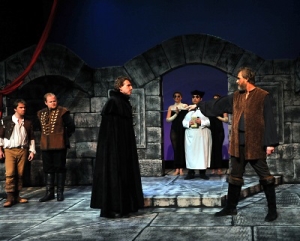
(l-r) Youngest son John (Max Gutfreund), middle son Geoffrey (Nathan Monk), eldest son Richard Lionheart (Tyler Ward), ghost dancers Jem Burke, Erny Rosales & Keely McLean, and King Henry (Don Matthews) have at it in Camelot Theatre’s The Lion in Winter. Photo by Steve Sutfin
The play was originally performed on Broadway in 1966, where it won a Tony Award for Rosemary Harris’s portrayal of Eleanor. It was made into a multiple academy award winning film in 1968 with a screenplay also written by author, James Goldman, which won an Oscar for Katherine Hepburn’s performance of Eleanor. (In reviewing the film, Roger Ebert declared that “Peter O’Toole’s
This is a very cerebral play – all the real plot movement is through dialogue, verbal sparring between the characters. Come prepared to pay attention and listen carefully. While the sparring is intense and dramatic, this really is a comedy, sprinkled with an unending stream of one liners. A few examples:
Eleanor: “I’m locked up with my sons… what mother doesn’t dream of that?”
King Henry: “What shall we hang — the holly, or each other?”
Prince Geoffrey: “I know. You know I know. I know you know I know. We know Henry knows, and Henry knows we know it. [smiles] We’re a knowledgeable family.”
Eleanor [to her jeweled necklace]: “I’d hang you from the nipples, but you’d shock the children.”
Henry II (of his sons): “The day those stout hearts band together is the day that pigs get wings.”
Eleanor in reply: “There’ll be pork in the treetops come morning.”
If you saw and enjoyed the Oscar winning film – you must see this stage play. The stage play came first and the screenplay was written by the same writer, the playwright, James Goldman. But the film leaves out some very good material in the play. Some was cut to save screen time, some because it is depicted visually (the film can describe things visually, while the play relies principally on well written dialogue, which is what makes the play so good). To shorten screen time, the film skimps on character development – Henry’s sons, the French King, etc. are virtually caricatures in the film, but are more fully developed and depicted in the stage play.
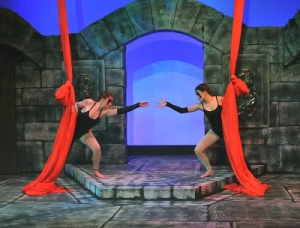
Harlequin Dancers Jem Burke and Keely McLean perform arial silk routine during opening sequence of Camelot Theatre’s The Lion in Winter. Photo by Steve Sutfin
So you should be getting the idea that this is a compelling play, which ought to be seen, for its awesome script, incredible depiction of dysfunctional family relationships, historical roots, and superb acting. But one more point about this production cannot be overlooked. This Camelot presentation of The Lion in Winter is a unique production – you won’t see this anywhere else, and if you don’t catch a performance before the end of its run on November 9, you may never again have the opportunity to see this interesting production. The director and company for this production have added something to the play which is incredibly creative, original, entertaining and spellbinding. The play is divided into multiple scenes, each presenting intense dramatic dialogue, by differing characters in different set locations (e.g. Act I is divided into 6 such scenes, with more following in Act II). Director Roy Von Rains, Jr. somehow came up with the inspiration to use Dancing Harlequins to make transitions from scene to scene, as well as in an ingenious aerial silk routine opening the play. The harlequin dancers portray ghosts interacting in dance with the characters, reiterating just completed scenes and foretelling what’s coming in following scenes. These dance routines are superbly scripted by choreographer Brianna Gowland, to a suitable assortment of music, which very beneficially for the audience, relieves the tension aroused in sparring scene after scene by these characters.
Performances of The Lion in Winter continue at Camelot Theatre, 101 Talent Avenue, Talent through November 9, Thursday thru Saturday 8:00pm, Sunday Matinees 2:00 pm. For tickets: order online at http://boxoffice.printtixusa.com/camelottheatre/eventcalendar, or call the box office at 541-535-5250, or in person at 101 Talent Avenue, Talent, Oregon.
Featured Image: Queen Eleanor (Livia Genise) and King Henry (Don Matthews) embrace in Camelot Theatre’s The Lion in Winter. Photo by Steve Sutfin
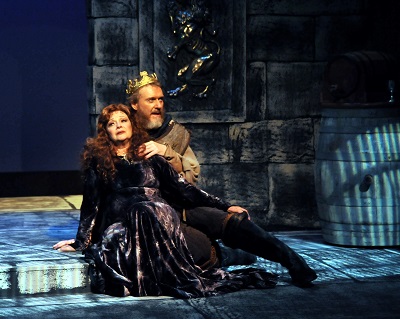
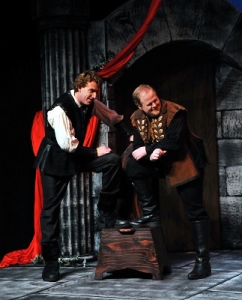
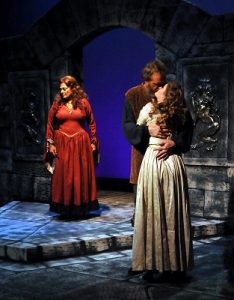
 Lee Greene was born & raised in a NJ family where the only religion worshipped was classical music, Leonard Bernstein was God, and the radio was constantly on and tuned to classical station WQXR (which is now always on in his Jacksonville home thanks to the miracle of the Internet). Growing up in the New York City metropolitan area and later while residing and practicing law in NYC, Lee attended oodles of Broadway and off-Broadway theater productions, as well as concerts and opera at Lincoln Center, Carnegie Hall and other NYC venues. Lee is now a retired attorney, runs a computer support business, and has served on the boards of Rogue Opera & Siskiyou Violins. Lee also writes Performing Arts reviews published on the website,
Lee Greene was born & raised in a NJ family where the only religion worshipped was classical music, Leonard Bernstein was God, and the radio was constantly on and tuned to classical station WQXR (which is now always on in his Jacksonville home thanks to the miracle of the Internet). Growing up in the New York City metropolitan area and later while residing and practicing law in NYC, Lee attended oodles of Broadway and off-Broadway theater productions, as well as concerts and opera at Lincoln Center, Carnegie Hall and other NYC venues. Lee is now a retired attorney, runs a computer support business, and has served on the boards of Rogue Opera & Siskiyou Violins. Lee also writes Performing Arts reviews published on the website,
Why do reviewers insist on giving away jokes within plays? This is a huge disservice to the production and a poor substitute for thoughtful commentary. Let the actors deliver the lines, which by the way, was done wonderfully in this production.
Michael – I agree with you, the actors ARE delivering the lines wonderfully in this production. The problem is they are delivering them to far too many empty seats. It’s great that you went to see it. My review presents some of the good jokes, in order to help people understand that the show IS a comedy and a very funny one at that. People don’t know that, and are staying away in the misplaced belief that it is a heavy serious historical melodrama about dysfunctional families. I wanted to try to get across just how well written and funny it really is, so people will come to it, and those lines can be delivered to filled seats.